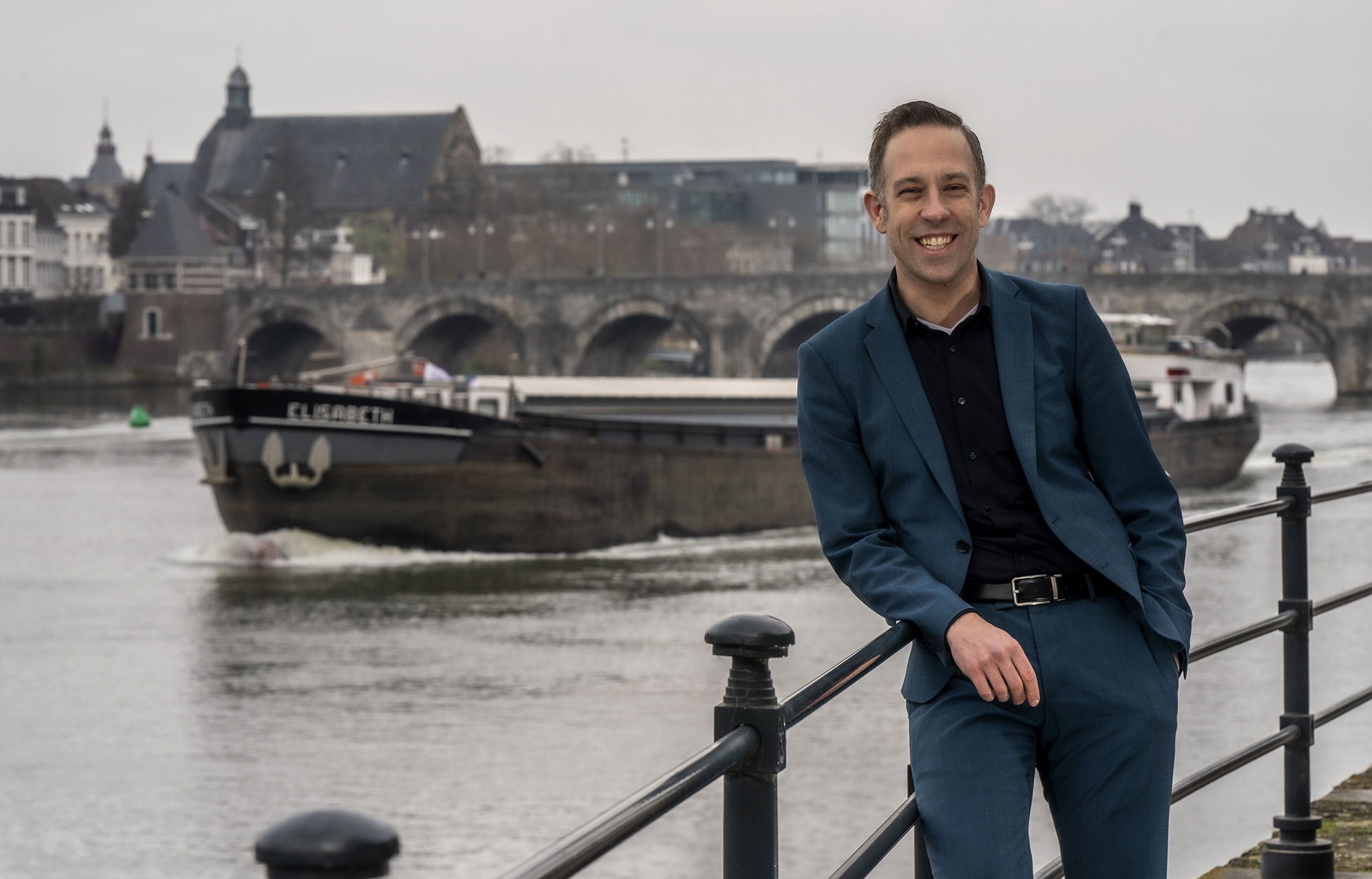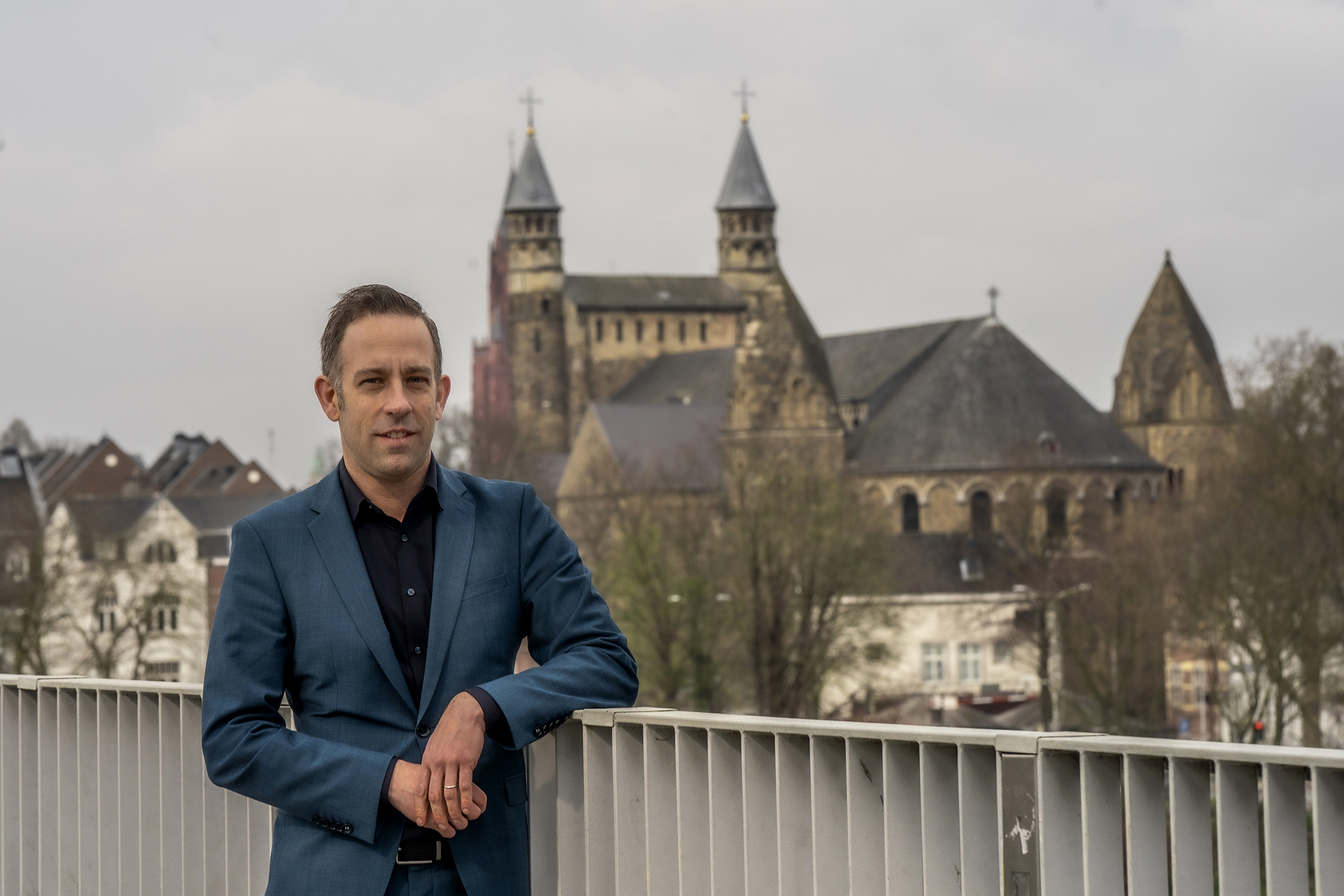Alumnus Davy Pieters: “The presence of the university has given the city a whole new international face”
Maastricht, Seattle, London, The Hague, Brussels, Maastricht: his career has taken a roundabout route so far. But for Davy Pieters (41), returning ‘home’ after an international career felt like coming full circle.
Spread your wings
“I knew I’d leave Limburg after my studies at Maastricht University. I also think that’s very natural; it’s good to spread your wings,” he begins. “I’d made a conscious choice to study in Maastricht because the university’s international profile suited my goal of working abroad, even if it meant I’d initially stay close to Meerssen, where I grew up.”
Great time
Between 2000 and 2005, Pieters studied International Economic Studies and European Studies at UM. Staying close to home by no means lessened the experience. “I was part of an international group of students. Having all those nationalities and languages around really shaped me. I was only 17 when I started university, but because I was surrounded by foreign students who were all slightly older than me, I became a lot more mature and developed quickly.”
That his studies were entirely in English had enormous added value. “I’d just finished high school with fairly average marks for English. Having to deal with the language worked out well for me, and has been a real advantage in my work.” As a bonus, he was obliged to go abroad for his studies. “I’d been dreaming of going to the US for years, so I looked into doing my exchange there. I ended up spending a semester at a university near Seattle. I had a great time.”
Coming home
That experience abroad left him wanting more. After his studies, Pieters went straight to London for a year to do another master’s degree. He then spent a decade working for the Dutch government, first in The Hague and later as a diplomat in Brussels. When his term ended in 2016, he took stock again. “Just as it had felt natural to fly the nest after graduating, this was a logical moment for my wife and me to return to the south. We wanted to have children and were keen to be closer to our families. I loved discovering the world, but in the end, Limburg feels like home.”
Text continues below the photo.
The ageing population is not a ‘Limburg’ problem. It’s an issue in the rest of the Netherlands, too; in fact, all of Western Europe.
Davy Pieters
Options and opportunities
Pieters quickly found a job that lived up to his ambitions. He immediately dismisses the prejudice that job opportunities in Limburg are limited. “There’s no shortage of things to do here. Of course, Maastricht isn’t London or The Hague. You won’t find a Zuidas in Limburg, but we didn’t expect that to be the case. If you look closely, there are plenty of career options and opportunities here. And there’s so much more space; it’s a fantastic living environment.” The term ‘ageing’ likewise rubs him the wrong way. “Let’s stop saying that all the time—it just reinforces the image. The ageing population not a ‘Limburg’ problem. It’s an issue in the rest of the Netherlands, too; in fact, all of Western Europe.”
After working for the Province of Limburg and the Municipality of Sittard-Geleen, Pieters is now a policy adviser in the field of heat transition for the Municipality of Maastricht. The work focuses on how we can wean ourselves off gas and onto alternative heat sources by 2050. For Maastricht, with its historic city centre, this is a challenge. At the same time, the job allows for a good work-life balance—a conscious choice for the father of two young children. “I love being able to be present and involved. It’s great not to have to travel too much and to be able to take them to school myself.”
Text continues below the photo.
I’m happy my children are growing up in a city that’s not too massive, but has that international allure.
Davy Pieters
International face
Pieters isn’t bothered by the clichés about working and living in this region. “We have a fantastic lifestyle, right in the centre of Maastricht, between the student houses. Another conscious choice, because it’s not a necessity here in Limburg, where there’s still so much space and you could easily choose somewhere quieter to live.” For the time being, Pieters and his family feel at home in the hustle and bustle of the city. “We love the liveliness of it. I’m happy to think that my children are growing up in a city that’s not too massive, but has that international allure.”
This is all thanks to the presence of the university, he says. “Maastricht has its own culture with plenty of tradition, but in recent years it’s also acquired a new, international face. That has so much added value for the city; it makes it an appealing place for young families to settle. And the open character of the university, which draws in so many international students, suits its location on the border with Belgium and Germany. That openness is also part of our culture in the Netherlands. Let’s not forget the benefits it has for all of us. And that applies to the whole of Europe.”
I can’t imagine this region without a university. First and foremost, it offers students a great education. And its added value goes so far beyond just a rich student life.
Davy Pieters
Keep talking
Pieters is concerned about the current controversy over the internationalisation of Dutch universities in general and UM in particular. “I can’t imagine this region without a university. First and foremost, it offers students a great education. And its added value goes so far beyond just a rich student life. Sure, you can argue that the growth of the university means the city is nearing full capacity, but if you ask me, that’s a separate issue. If you take a Limburg-wide perspective, there are ample opportunities outside Maastricht. I just hope national politicians will stop using a single yardstick and take a different view of the importance and impact of an international university here. We need to keep the lines of communication open—at the national level, but also as residents and stakeholders here in the region. We have to recognise the importance of this institution, cherish it and fight for it.”
Text: Sanne Tummers
Photography: Harry Heuts
Maastricht University is proud to be the most international university in the Netherlands. We are grateful for the richness and diversity provided by our international staff, students and study programmes—and the ensuing endless supply of inspiring stories. This is one of those stories.
#FromTheRegionForTheRegion.
Do you want to read, watch and listen to more stories? Visit our campaign page.
Also read
-
Flour, family, and forward thinking: the evolution of Hinkel Bäckerei
In the heart of Düsseldorf, the comforting aroma of freshly baked bread has drifted through the streets for more than 130 years. Since its founding in 1891, Hinkel Bäckerei has evolved from a small neighborhood bakery into a cherished local institution.
-
The University Fund Limburg's new Annual Fund Campaign is live!
Every year during the holiday season, the UM community comes together to uphold a special tradition: supporting projects that contribute to a healthier, fairer and more sustainable society. Will you join us?
-
A new wave of talent emerges from the School of Business and Economics
On Sunday, November 30, 2025, the Maastricht University School of Business and Economics (SBE) proudly celebrated the achievements of over 1,461 graduates from both bachelor’s and master’s programs. The festive ceremony took place at the MECC Maastricht and marked a significant milestone for the SBE